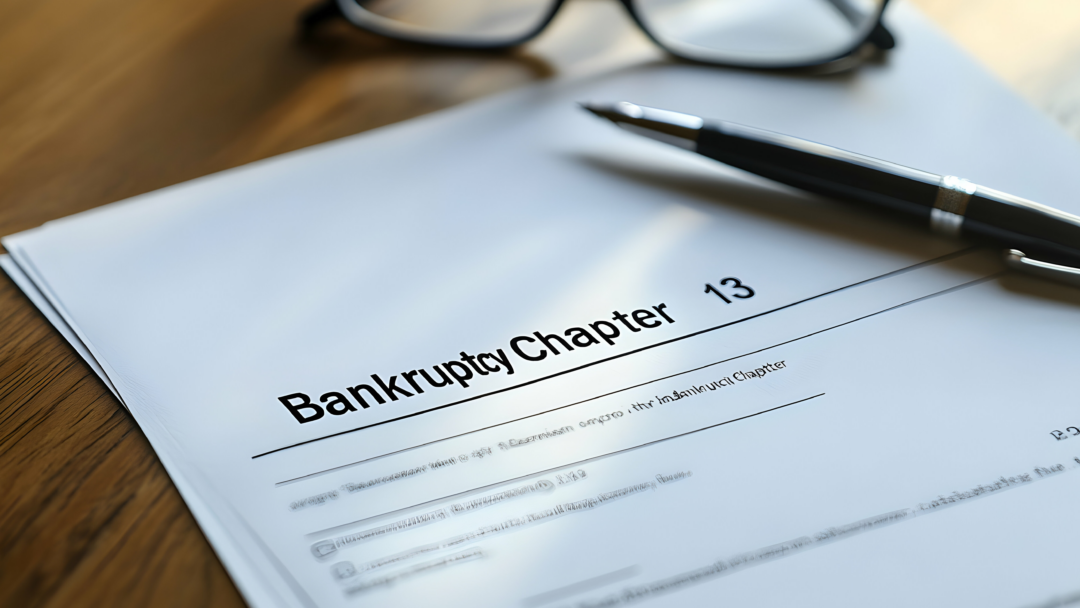How to File for Bankruptcy
- Chapter 7 involves selling assets to clear debts; Chapter 13 allows repayment over time to keep assets. .
- Bankruptcy impacts credit for 7-10 years, may involve asset loss, and has emotional and financial costs.
- Alternatives include credit counseling, debt consolidation, and debt settlement.
- Some debts, like child support and student loans, cannot be discharged.
- Consult experts to explore options and protect assets.
Free Consultation with a Certified Debt Specialist
Start with a Free No-Obligation Consultation
Are you considering bankruptcy to get a handle on your debt? It’s a big decision. Let’s explore the steps involved and what it means for your finances so you can make the best choice for your fresh start.

See if you qualify for debt relief!
Should I file for Bankruptcy?
Dealing with debt can be overwhelming. Bankruptcy is a legal process to help you get a fresh financial start. There are three main chapters of bankruptcy, each with its approach to dealing with your obligations:
- Chapter 7: Liquidation: This is a quicker process where a court-appointed trustee sells your non-exempt assets (like a car or second home) to pay back creditors. This option eliminates most debts but may require sacrificing some possessions.
- Chapter 13: Repayment Plan: If you prefer to keep your assets, Chapter 13 might be a better fit. Here, you create a court-approved plan to repay your creditors a portion of what you owe over 3-5 years. This allows you to catch up on missed payments and eventually have the remaining debts discharged.
- Chapter 11: Business Reorganization (not usually for individuals): This chapter is typically used by businesses facing financial hardship. It allows them to develop a restructuring plan to repay creditors while staying operational.
Don’t Take Bankruptcy Lightly
While bankruptcy offers relief from debt, it’s a major decision with long-term effects:
- Credit Score Drop: Expect a big impact on your credit (7-10 years) making loans, credit cards or even renting an apartment harder and more expensive.
- Potential Asset Loss: Chapter 7 might require selling some belongings to repay creditors (cars, investments).
- Emotional Impact: Bankruptcy can be stressful and lead to feelings of shame for some.
- Costs: Filing fees and lawyer costs can add up.
You may want to explore all options before filing. Consider credit counseling for repayment plans and talk to a lawyer about protecting your rights. Bankruptcy has lasting consequences, so getting expert guidance may help you make the best choice for your financial future.
Alternatives to Bankruptcy
Drowning in debt can feel hopeless, but bankruptcy isn’t your only option. Here are some strategies to consider that may help you regain control of your finances without the long-term downsides associated with bankruptcy.
1. Credit Counseling: Non-profit credit counselors are financial experts in your corner. They’ll analyze your situation, create a personalized budget and help you develop a plan to manage your debt. They may also negotiate lower interest rates and repayment plans with your creditors, saving you money and easing your burden.
2. Debt Consolidation: This strategy streamlines your debt by combining multiple high-interest debts into a single loan with a lower interest rate. This simplifies your repayment process and may save you money on interest in the long run. Explore options like personal loans or home equity loans. If you have excellent credit, a 0% introductory APR balance transfer credit card may offer temporary relief from high interest charges.
3. Debt Management Plan (DMP): A credit counselor can work with you to create a DMP. They’ll negotiate with your creditors to lower your monthly payments and create a manageable repayment plan, typically lasting 3-5 years. While creditor participation isn’t guaranteed, a DMP may be a good option if you can afford the monthly payments. Be aware that some credit card accounts may be closed as part of a DMP, but a credit counselor can help you understand the potential impact on your credit.
4. Debt Settlement: Debt settlement companies can be a valuable tool for those struggling with overwhelming debt. They work with your creditors to negotiate a lump-sum payment that settles your debt for less than the amount owed. This may significantly reduce your debt burden and provide a faster path to becoming debt-free. While there are fees associated with debt settlement companies (typically 15-25% of the settled debt), they may be offset by the significant debt reduction achieved.
These alternatives may still have some impact on your credit score, but the effects are generally less severe and more temporary than bankruptcy. Consulting a credit counselor or financial advisor can help you determine the best course of action for your specific situation.
How do you know if you are 100% ready for bankruptcy?
Knowing when to file for bankruptcy and when to explore other options is key to getting back on track financially. Here are some questions to assess your financial health and determine if bankruptcy may be the right choice. Discussing these with a lawyer is also recommended.
- Are you living paycheck to paycheck or spending more than you earn each month? Ideally, your income should cover essentials (rent, food, utilities) with some breathing room for savings and surprises. If you’re constantly falling short, bankruptcy could be an option to consider.
- Are you only making minimum payments on your credit cards and struggling to keep up? Those high interest rates can make it tough to get ahead. If your balances keep climbing even when you try, explore other ways to manage that debt.
- Do you have to rely on credit cards to pay for necessities like groceries or utilities? Everyday expenses shouldn’t be financed with credit cards. The interest charges quickly add up, making it harder to pay down your debt.
- Do you frequently receive calls from bill collectors? These calls can be stressful. Before letting it get to you, have you tried contacting them directly? You may be able to negotiate a payment plan that works for you both.
- Are you unsure of the total amount you owe in debt? Rising balances and forgotten creditors are warning signs. Before things snowball, consider seeking help with managing your finances. Debt consolidation or credit counseling could be a good first step.
- Have you considered debt consolidation as a way to simplify your debt management? Debt consolidation could be a way to simplify things. It combines your credit cards, medical bills, or personal loans into one loan, making your payments easier to manage and potentially giving you more time to repay.
- As a last resort, would you be willing to sell some possessions to pay off debt and avoid bankruptcy? Downsizing your living space or letting go of a car may be hard choices to make. However, these tough decisions may also be the key to becoming debt-free and preventing the need to file for bankruptcy.
- Does bankruptcy eliminate all types of debt? Bankruptcy isn’t a one-size-fits-all solution. Student loans, for example, usually can’t be discharged. If your main burden is debt that won’t be eliminated through bankruptcy, consider talking directly to your creditors. They may work with you on repayment plans or loan modifications to make your payments more manageable.
Filing for bankruptcy involves several steps:
What do I need to do?
- Gather Documents: Collect credit reports, debt lists, tax returns, pay stubs, bank statements and asset/debt documentation.
- Credit Counseling: Take a mandatory course from a government-approved provider within 6 months of filing.
- Complete Forms: Fill out over 20 forms (lawyer optional) detailing your financial situation and choosing your bankruptcy chapter (7 or 13).
- Filing Fee: Pay the filing fee – $338 for Chapter 7, $1,738 for Chapter 11 and $313 for Chapter 13 (installment plans or waivers may be available for low-income households).
- Review and Submit Forms: Print, sign, and review your forms, following local court filing requirements.
- File at Local Court: Submit your forms and fee (or waiver application) to the bankruptcy court clerk. They’ll process your case electronically and provide further instructions.
- Mail Documents to Trustee: Send required documents (tax returns, pay stubs, bank statements) to your assigned trustee as instructed.
- Financial Management Course: Complete a course on financial management and budgeting to avoid future debt.
- Attend Creditor Meeting: Attend a meeting of creditors, called a 341 Meeting, to verify your identity and answer questions from the trustee. Creditors can attend but rarely participate. Bring the required documents.
How to File for Bankruptcy FAQs
How much debt should I have to file for bankruptcy?
You don’t necessarily need large amounts of debt to file for bankruptcy. There is no minimum amount required by law.
However, it’s important to consider other factors besides the total amount you owe.
- Can you realistically repay your debts?
- Are your creditors willing to work out a payment plan with you?
- What kind of debt do you have (can it be discharged in bankruptcy)?
- Do you meet the income requirements for Chapter 7 bankruptcy (if that’s the chapter you’re considering)?
There is a maximum debt limit for Chapter 13 bankruptcy, but that’s not a main factor in deciding if you should file for bankruptcy altogether.
Which bankruptcy clears all debt?
While Chapter 7 is the type of bankruptcy designed to clear debt, it doesn’t necessarily discharge all of it. Here’s a breakdown of what Chapter 7 bankruptcy can and cannot do:
Discharged Debts:
- Unsecured debts like credit card debt, medical bills, and personal loans.
Debts Not Discharged:
- Child support and alimony
- Student loans (usually)
- Certain tax debts
- Secured loans (though the debt may be discharged, the lien on the collateral remains)
Even for unsecured debts, there can be exceptions. For instance, if you recently used your credit card to buy luxury goods or get cash advances, the creditor might object to having that debt discharged.
How do I file for bankruptcy without losing my home?
It’s perfectly normal to have concerns over personal loss when facing bankruptcy, especially when it comes to your home.
Keeping your house in bankruptcy depends on two key things:
- Chapter Choice: Chapter 13 lets you create a plan to repay missed mortgage payments and potentially keep your home.
- Home Equity: If you owe more than your house is worth, keeping it through bankruptcy may be difficult.
Being current on your mortgage payments may improve your chances of keeping your house regardless of the chapter you file under.
What debt is not forgiven if you file for bankruptcy?
While bankruptcy can provide relief from overwhelming debt, it doesn’t eliminate all obligations. Here are some types of debt that typically won’t be forgiven in bankruptcy:
- Alimony and Child Support: These court-ordered payments for spousal or child support remain your responsibility even after bankruptcy.
- Certain Unpaid Taxes: Back taxes may not be forgiven, especially recent tax debts.
- Debts from Harming Others: If you intentionally injured someone or damaged their property, you’ll still owe them compensation. This applies to injuries caused by driving under the influence as well.
- Unlisted Debts: Debts you forget to include in your bankruptcy filing generally won’t be discharged.
- Student Loans: Discharging student loans through bankruptcy is difficult, but may be possible in some hardship cases.
Will I still owe money after bankruptcy?
You may still owe money after bankruptcy for certain debts. Here’s what isn’t forgiven:
- Secured Debts You’re Keeping: If you want to hold onto assets like a car with a loan, you’ll likely still owe payments.
- Recent Government Student Loans: Discharging these within 7 years of leaving school is usually difficult.
- Court-Ordered Payments: Child support, spousal support, fines and penalties typically survive bankruptcy.
- Debts From Crimes: You’re still responsible for financial obligations arising from criminal acts.
All You Need To Know
We’ve put all of our essential resources in one spot. Everything from debt resolution to taking control of your financial future . Need to talk? Our experts are here to help. Call us anytime for a free no-obligation consultation.
Is Bankruptcy the best option for you?
- Explore Debt Relief
- Up To 50% Lower Monthly Payments
- Reduce Multiple Payments to One
- Debt Free in 24-48 Months
- Quick 2-Minute Approval
Essential Reading
The latest debt relief news, tips, and resources from our team.
We’ve transformed the lives of more than 500,000 people

“The anxiety is gone, I am credit card debt-free. And that right there, I never thought I would be able to say those words, and it just feels so good.”
Michelle saved 23% on her debt

Now I’m able to go on vacation for the first time in a long time- I was able to go and relax. I couldn’t do that before.

Now I wake up knowing that I am paying off my debt, it’s like a weight lifted off my chest and I can breathe a bit more.

“The anxiety is gone, I am credit card debt-free. And that right there, I never thought I would be able to say those words, and it just feels so good.”
Michelle saved 23% on her debt

Now I’m able to go on vacation for the first time in a long time- I was able to go and relax. I couldn’t do that before.

Now I wake up knowing that I am paying off my debt, it’s like a weight lifted off my chest and I can breathe a bit more.

“The anxiety is gone, I am credit card debt-free. And that right there, I never thought I would be able to say those words, and it just feels so good.”
Michelle saved 23% on her debt

Now I’m able to go on vacation for the first time in a long time- I was able to go and relax. I couldn’t do that before.






